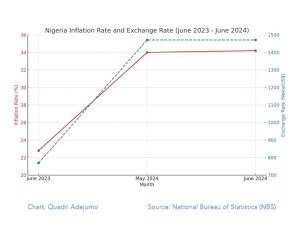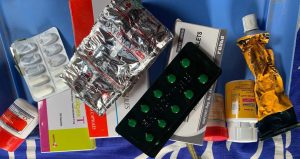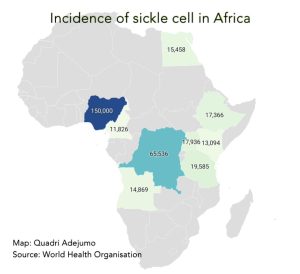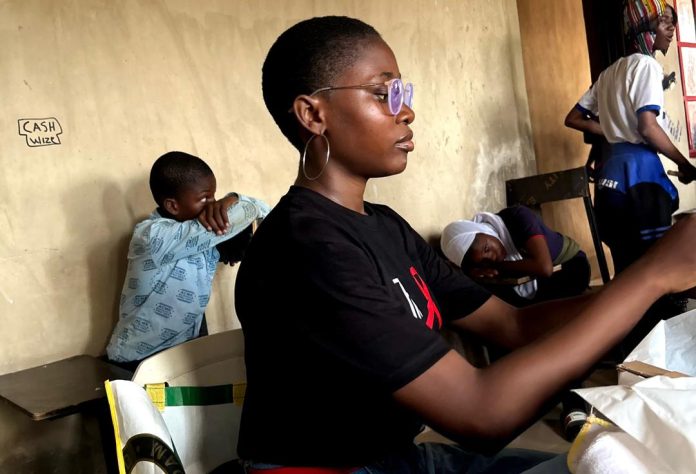By Quadri Adejumo
Timilehin Ishola, 22, wakes up every morning uncertain of what life will bring, unsure if her next treatments will be affordable. Living with sickle cell in Nigeria, where healthcare remains a luxury, she faces the dual challenges of high living costs and expensive treatment.
Her struggle highlights the broader difficulties of living with a chronic illness in a country where many cannot afford basic healthcare.
“Have you seen the increase in prices in the country?” Timilehin asked, her voice tinged with disappointment. “It’s been so hard. Accessing healthcare, getting medications, and managing my condition—it’s exhausting and financially draining. My medications have tripled in price.”
This price surge was a shock for Timilehin, who earns a modest income teaching students. Her condition limits her job opportunities, forcing her to focus on her health while working as a virtual English teacher.
During his inauguration, President Bola Ahmed Tinubu announced the end of Nigeria’s fuel subsidies, leading to a sharp rise in petrol prices. This increase triggered a surge in the cost of various goods and services, including healthcare, contributing to the country’s soaring inflation.
According to the National Bureau of Statistics (NBS), Nigeria’s inflation rate reached a 28-year high in June 2024, climbing to 34.2% from 22.8% in June 2023 and 34.0% in May 2024. This spike in inflation was accompanied by a sharp decline in the naira’s value, with the official exchange rate averaging N1471/US$ in June 2024, compared to N769/US$ in June 2023.
As a result, hospital bills and the cost of medications, particularly for those living with chronic conditions like sickle cell, have also increased, adding to the financial burden on patients.

The cost of illness
Timilehin vividly describes the escalating costs she faces. Getting her medications has become a daunting challenge amid the rising cost of healthcare. “Filling my prescriptions, routine tests, lab work—it’s all terrifying,” she said. “By the end of the month, I spend no less than N100,000 on tests and medications. When my complications worsen and I’m admitted to the hospital, it can exceed N150,000.”
She highlighted the stark contrast between past and present costs. “The price of my treatments has skyrocketed. Astymin, which used to be N1,900, now sells for over N5,000. Hydroxyurea, once around N2,000, is now N6,000. Seretide jumped from N8,000 to between N23,000 and N30,000, depending on the pharmacy.”

Sickle cell disease (SCD) refers to a group of inherited blood disorders characterized by symptoms like anemia and blocked blood vessels. It affects millions worldwide, with 80% of cases occurring in sub-Saharan Africa. Nigeria bears the highest burden, with 25% of the population carrying the sickle cell trait.

Sickle cell disease (SCD) is the most common genetic disorder in Nigeria, affecting over 4 million people. According to the World Health Organization (WHO), the prevalence is 20 per 1,000 live births, with 150,000 children born with SCD each year. Approximately 2% of babies in Nigeria are affected by sickle cell anemia.
Despite Nigeria’s high prevalence of sickle cell disease, the personal experiences of those living with it are often overlooked.
Timilehin Ishola’s story provides a stark outline of the challenges Nigerians face in accessing essential medical care. Like many others across the country, she battles both the high cost of living and the daily struggles of managing a chronic illness.
Timilehin’s voice trembles as she describes the days when she had to endure the pain of her sickle cell crises and the overwhelming emotional and financial burden on her family. “There were times when it was difficult to get proper care because of recurrent crises,” she shared.
“There were days when things became really hard. Financially, we struggled, spending most of our money on countless hospital admissions. Sometimes, we had to decline treatment or medications because we couldn’t afford them. There were days we had to postpone my hospital appointments due to finances. It hasn’t been easy.”
Her story is one of countless sacrifices, marked by moments when her family had to choose between life-saving medications and other essentials, filled with uncertainty and a relentless quest for a better future.
Timilehin’s story is not just about her struggles; it’s a call to action for a more compassionate and affordable healthcare system. When asked about the changes she wanted to see, she responded urgently, “The first thing is affordable healthcare.”
“We need our lab tests and medications to be affordable. They are really expensive and not as accessible as they used to be, making life incredibly difficult.”
Timilehin stressed the importance of accessible healthcare, reflecting on the daily challenges of navigating the system. “Healthcare should be within reach for everyone,” she emphasized.
She recounted the frequent frustration of searching for essential medications, often visiting multiple pharmacies in vain. “Even government hospitals sometimes don’t have the prescriptions you need,” she lamented. “You have to go through the stress of searching multiple places just to find what you need. The lack of accessibility and affordability shouldn’t be the norm.”

Crisis in Healthcare
Dr. Feyisara Osho, a Lagos-based expert, expressed deep concern about the current state of healthcare in Nigeria. “Many people are struggling to keep up with their treatment due to the economic downturn. It’s heartbreaking,” she said.
“People are dying because they can’t afford medical care. The situation is dire, and the government needs to address the economic crisis urgently. Otherwise, the loss of lives will continue.”
Also, a Pharmacist based in Lagos, Nneji Tobechukwu also highlighted the impact of the economic crisis on healthcare. “The situation is so dire that it’s emotionally draining. A patient recently had to forego routine drugs because she couldn’t afford them. It was heartbreaking,” Tobechukwu shared.
Patients are increasingly frustrated as the prices of medications and medical services have surged, with costs doubling or tripling. “Many patients can’t afford their medications or other healthcare services due to the severe price increases. It has never been this bad,” Tobechukwu added.
Resilience Despite Challenges
Despite these challenges, Timilehin Ishola’s resilience stands out. Growing up with sickle cell disease, she faced significant difficulties and discrimination. “Living with sickle cell has been incredibly tough,” Timilehin reflected. “As a child, I was often isolated, frequently sick, and missed a lot of school.”
She described the emotional pain of being sidelined from activities and the hurtful stereotypes she encountered. “I faced names and taunts because of my condition, like ‘power ranger’ and ‘vampire.’ It was deeply painful and left me emotionally scarred,” she recalled.
Advocacy and Change
Despite the dire situation, advocacy groups and NGOs are making a difference. OA Initiative, a Nigerian non-profit organization, has organized blood drives and enrolled sickle cell patients in health insurance schemes. They also launched a sickle cell club to provide social and emotional support.
“The economic difficulties not only affect physical health but also take a toll on mental well-being,” Timilehin noted. “Accessible therapy support is crucial for managing the trauma associated with chronic illness.”
Policy Recommendations
Criticism of the Nigerian government’s response to healthcare issues is widespread. Experts call for significant reforms to improve patient care. “The National Health Insurance Scheme (NHIS) should be expanded to cover more Nigerians and make healthcare affordable,” Tobechukwu suggested.
“Increased funding for healthcare is essential to improve infrastructure, ensure medicine availability, and support healthcare workers.”
Policymakers are urged to prioritize inclusive approaches to improve living standards for patients. “The government should strengthen regulations to ensure quality and safety in healthcare services,” Tobechukwu added.
Timilehin also emphasized the need for workplace protections for sickle cell patients. “We need advocates who will fight for our rights, including job security,” she said.
Government’s Response
In response to the economic difficulties, the Nigerian government has introduced a new clinical palliative plan aimed at improving access to medical services and reducing financial burdens. Initiated by the Federal Capital Territory Administration (FCTA), the plan provides free treatment, medications, and food supplies to patients.
At the launch in Abuja, Adedolapo Fasawe, mandate secretary of the FCTA Health and Environment Secretariat, explained that the initiative leverages the national health insurance scheme. “The scheme will cover up to two months of medication for beneficiaries, allowing them to use their funds for other needs,” Fasawe said. “To qualify, individuals must register for the FCT health insurance scheme, which offers comprehensive coverage at a fixed annual rate.”




